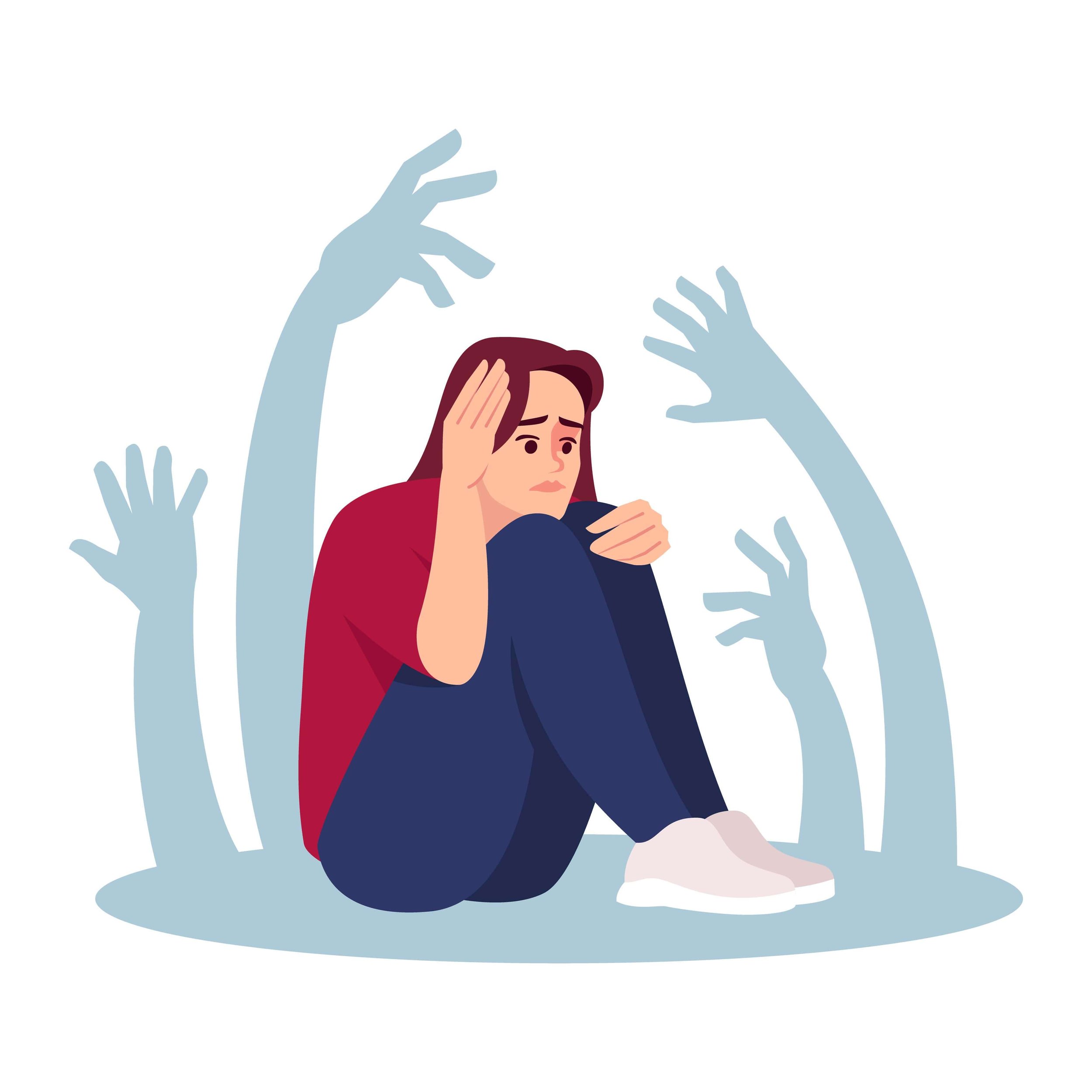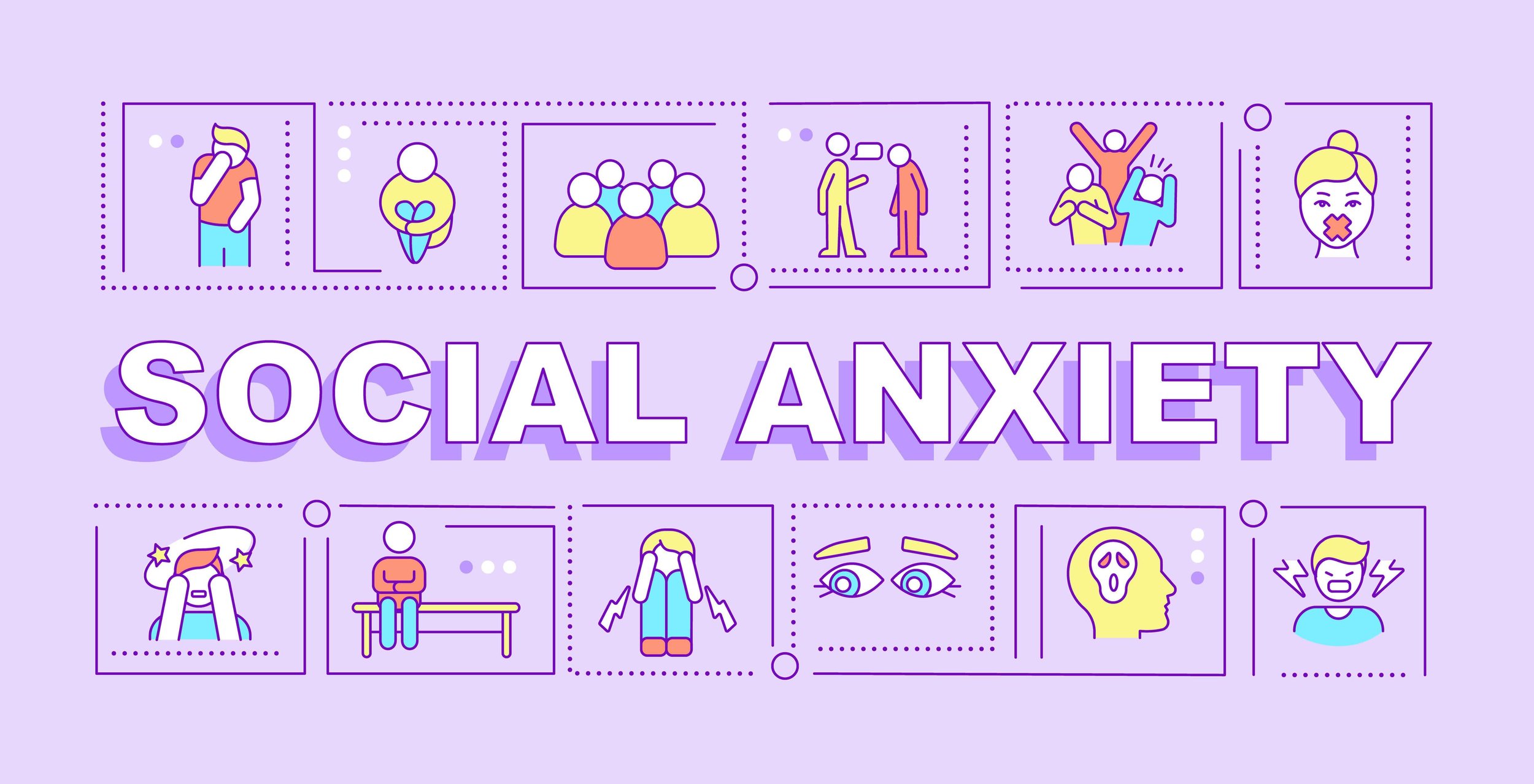
Social Anxiety Therapist in Washington
An online social anxiety therapist is a mental health professional who provides virtual counseling and therapy services to individuals struggling with social anxiety, helping them manage their symptoms and improve their quality of life.
Find a Social Anxiety Therapist Near You
With the advent of telehealth services, seeking healthcare remotely has never been more convenient and accessible. People with social anxiety disorder can benefit significantly from online therapy since it provides a comfortable and confidential space to receive treatment without leaving the comfort of their homes. At times, social anxiety can exacerbate symptoms of stress and anxiety, making it challenging to seek in-person care.
If you're searching for a social anxiety therapist near you in the Washington area including Seattle, Spokane, and Tri-Cities, Mindful is here to provide online therapy services that are tailored to meet your unique needs.
What is Social Anxiety Disorder?
Social anxiety disorder, also known as social phobia, is a mental health condition that affects how a person interacts with others in social situations. People with social anxiety disorder experience intense fear and anxiety about being judged or negatively evaluated by others, leading them to avoid social situations or endure them with extreme distress. This can make it challenging for them to engage in everyday activities.
An individual with social phobia may find it difficult to form and maintain relationships, perform in public, speak up in groups, and participate in activities they enjoy. Social anxiety disorder is a common condition, affecting millions of people worldwide, and it can be treated through a combination of therapies, medication, and self-help techniques.
Symptoms of Social Anxiety
Symptoms of social anxiety disorder can vary from person to person but common symptoms typically include:
Fear of being judged or negatively evaluated by others
Intense anxiety and distress in social situations, including parties, meetings, public speaking, and dating
Avoidance of social situations or enduring them with extreme distress
Physical symptoms such as sweating, shaking, blushing, rapid heartbeat, nausea, and difficulty speaking
Worrying excessively about upcoming social events and replaying past social interactions in your head
Difficulty making eye contact or speaking up in groups
Fear of being the center of attention or of humiliating oneself in front of others
Mindful - The Premier Social Anxiety Therapist in Washington
If you are looking for a "social anxiety therapist near me", look no further than Mindful. Mindful is an online mental health care company that offers comprehensive psychiatric services including medication management and alternative therapies for a wide range of mental health disorders for Washington residents.
Our online therapy services are tailored to help individuals struggling with social anxiety to overcome their fears and regain control of their lives. Our team of experienced and compassionate professionals works closely with each client to develop a personalized treatment plan that utilizes evidence-based methods.
Our goal is to help our clients live fuller and more meaningful lives by overcoming their fear of social situations. We are dedicated to providing the best possible care to those seeking relief from social anxiety disorder.
Social Anxiety Group Therapy
At Mindful, we offer social anxiety group therapy sessions for individuals struggling with social anxiety disorder. Our group therapy program provides a supportive and safe environment where clients can connect with others who share similar experiences.
During these sessions, our skilled therapists utilize cognitive-behavioral therapy techniques to help clients learn new coping skills and strategies for managing social anxiety. Through group discussions, role-playing, and exposure exercises, clients can practice social situations in a controlled and safe environment.
Group therapy has proven to be an effective treatment for social anxiety, as it can provide clients with the necessary support and accountability to overcome their fears. Our group therapy program is designed to complement individual therapy sessions and can be an effective form of treatment for those seeking relief from social anxiety disorder.
Treatments Available for Social Anxiety Disorder
While there is no cure for social phobia, there are many treatments available that can help people manage their symptoms. With the right treatment plan and support system, individuals living with social anxiety disorder can lead happy and fulfilling lives.
Counseling therapy
Counseling therapy is a type of psychotherapy that is used to help individuals manage their emotions, thoughts, and behaviors. It can be an effective form of treatment for social anxiety disorder because it focuses on identifying negative thought patterns and behaviors that could be contributing to their anxiety.
Counseling sessions are typically held with a trained therapist who will work with the individual to develop coping strategies and techniques aimed at reducing symptoms. The therapist may also provide guidance on how to handle difficult situations or relationships in order to create a more positive environment.
Counseling therapy has been shown to be effective in reducing symptoms of social anxiety disorder and can help individuals gain confidence in social settings and learn how to better manage their anxiety.
Medication
Medications can be an effective treatment for social anxiety disorder and are often used in combination with counseling or other forms of therapy.
Medications that can treat social anxiety disorder include selective serotonin reuptake inhibitors (SSRIs), such as paroxetine (Paxil) and sertraline (Zoloft); selective norepinephrine reuptake inhibitors (SNRIs), for example, venlafaxine (Effexor); and propanol. These medications work by increasing the levels of certain neurotransmitters in the brain, which can help reduce symptoms of anxiety.
However, it is important to note that these medications may take several weeks to begin working properly. Additionally, they may cause some side effects, so it is important to discuss any concerns with your medical provider before starting medication.
Types of Therapy for Social Anxiety
Therapy is an effective treatment for social anxiety disorder, and can help individuals to develop coping strategies and learn to manage their symptoms. The following is a list of the different types of therapy options available to treat social anxiety:
It is important to remember that different types of therapy are appropriate for different people, so it is important for individuals suffering from social anxiety disorder to consult a therapist in order to determine which type of therapy will work best for them.
Exposure Therapy
Exposure Therapy is a type of therapy used to treat social anxiety disorder. The goal of exposure therapy is to expose individuals to the situations they fear in order to reduce their anxiety and help them learn how to cope with their fears. This type of therapy uses gradual exposure to the feared situation, starting with the least threatening and working up towards the most difficult.
During the session, the therapist will help the individual identify irrational thoughts that are causing or exacerbating their fear, as well as teach them healthy coping strategies. Exposure Therapy has been shown to be effective at reducing symptoms associated with social anxiety disorder, such as fear of public speaking or other social situations.
Group Therapy
Social anxiety group therapy is a form of therapy that focuses on helping individuals with social anxiety disorder learn to cope and manage their symptoms. This type of therapy typically involves meeting with a group of other people with similar experiences, which allows individuals to share their stories, feelings, and struggles in a safe environment.
During the sessions, the therapist will help the group identify irrational thoughts that are causing or exacerbating their fear and teach healthy coping strategies for managing anxiety. The goal of social anxiety group therapy is to provide support and guidance to participants so they can gain confidence in their ability to handle social situations.
Research has shown that this type of therapy can be effective at reducing symptoms associated with social anxiety disorder such as fear of public speaking or other social interactions.
Cognitive Behavioral Therapy
Cognitive Behavioral Therapy (CBT) is a popular form of therapy used to treat social anxiety disorder. CBT works by helping individuals identify and challenge negative thought patterns, as well as modify their behavior in order to reduce anxiety.
During CBT sessions, the individual learns how to recognize and replace unhelpful thinking with more helpful thoughts and beliefs. They also learn how to cope with stressful situations, practice relaxation techniques, change unhelpful behaviors, and develop positive coping strategies.
CBT has been shown to be effective in reducing symptoms of social anxiety disorder, such as fear of public speaking or other social situations.
Mindfulness-Based Stress Reduction
Mindfulness-Based Stress Reduction (MBSR) is an evidence-based practice that combines mindfulness meditation, body awareness, and yoga to reduce stress and create a sense of well-being.
It is based on the concept that our thoughts, emotions, and physical sensations can be observed in a nonjudgmental way without reacting to them. By doing this, we can gain insight into our own inner states and learn how to better respond to external stimuli.
MBSR has been proven to reduce levels of stress hormones, improve sleep quality, and increase cognitive functioning. Additionally, it has been found to have a positive effect on overall physical health by reducing chronic pain and improving immune system functioning.
Acceptance and Commitment Therapy
Acceptance and Commitment Therapy (ACT) is a form of psychotherapy that encourages individuals to accept their thoughts, emotions, and physical sensations in order to be more mindful of the present moment. This practice emphasizes acceptance over judgment or avoidance when it comes to difficult experiences.
ACT utilizes mindfulness-based strategies such as meditation, self-inquiry, and guided imagery to help clients gain insight into their own inner states. It also focuses on cultivating values such as compassion and kindness towards oneself and others. Through this process, individuals can learn how to respond to challenging situations with greater clarity and purpose.
Research has found that ACT is effective in treating anxiety disorders, depression, substance use disorders, chronic pain, stress management, eating disorders and more.
Dialectical Behavioral Therapy (DBT)
Dialectical Behavioral Therapy (DBT) is a form of psychotherapy that focuses on helping individuals regulate their emotions and behaviors. This type of therapy combines cognitive-behavioral techniques with mindfulness practices to help people effectively cope with distressful situations. It places emphasis on understanding the interconnectedness between thoughts, feelings, and behaviors in order to make positive behavioral changes.
DBT utilizes various strategies such as problem-solving skills, cognitive restructuring, interpersonal effectiveness skills, distress tolerance skills, and emotion regulation skills to help individuals manage their emotions more effectively.
Research has found that DBT is particularly effective for treating disorders such as borderline personality disorder, substance use disorders, and post-traumatic stress disorder.
Benefits of Online Therapy for Social Anxiety
Online therapy has become a popular and effective solution for those seeking treatment for social anxiety. With the convenience of being able to access therapy from anywhere, individuals no longer have to worry about travel time or scheduling conflicts. Additionally, online therapy provides a comfortable and familiar environment for individuals who may feel anxious or uncomfortable in a traditional therapy setting.
This sense of ease often leads to more open and honest communication between therapist and client, which can enhance the effectiveness of treatment. Through online therapy, individuals with social anxiety can receive the support they need to improve their mental health and quality of life, all from the comfort of their own homes.

Get started now
Getting started with Mindful is an easy to follow three-step process.
Schedule An Appointment With Mindful Today
If you are struggling with social anxiety, it is crucial to seek the help of an experienced therapist. Social anxiety can have a significant impact on your daily life, and without the proper treatment, it can lead to a range of negative consequences. At Mindful, we understand the challenges of living with social anxiety, and we are here to help.
Our team of mental health professionals offers online psychiatric services in the Washington area including Seattle, Spokane, and Tri-Cities. We are highly experienced in providing effective treatments for social anxiety and offer a wide range of mental health services to help your social anxiety such as social anxiety group therapy sessions.
We believe that everyone deserves to live a happy and fulfilling life, free from the burden of social anxiety. So, if you are ready to take the first step towards a better life, we encourage you to contact us or schedule an appointment with us today. Let us help you overcome your social anxiety and start living your best life.
FAQs
-
The triggers of social anxiety can vary from person to person, but some common triggers include:
Fear of rejection: Many people with social anxiety fear being rejected by others. They worry that they will be judged or criticized, which can make them feel embarrassed, ashamed, or inferior.
Fear of humiliation: Some people with social anxiety fear being humiliated in public. They worry that they will do or say something embarrassing, which can make them feel exposed, vulnerable, or powerless.
Fear of scrutiny: Others fear being scrutinized or evaluated by others. They worry that they will be judged or evaluated negatively, which can make them feel self-conscious, inadequate, or inferior.
Past negative experiences: People who have experienced social rejection or embarrassment in the past may develop social anxiety as a result. They may fear similar experiences in the future and avoid social situations as a way of protecting themselves.
Biological factors: Social anxiety may also have a biological basis. Some studies suggest that imbalances in neurotransmitters like serotonin and dopamine may contribute to the development of social anxiety.
-
Group therapy can be an effective treatment for social anxiety. Group therapy for social anxiety typically involves a small group of people who meet regularly with a therapist to discuss their social anxiety and practice new skills in a supportive environment.
Research has shown that group therapy can be as effective as individual therapy for social anxiety. In fact, some studies suggest that group therapy may be more effective than individual therapy in certain cases. Group therapy provides a supportive environment in which people can practice social skills, receive feedback from others, and gain a sense of belonging and acceptance.
Group therapy can also be more cost-effective than individual therapy, as the cost of therapy is shared among the group members. However, group therapy may not be suitable for everyone. Some people may prefer individual therapy or may feel uncomfortable in a group setting. It's important to discuss the pros and cons of group therapy with a therapist to determine if it's the right choice for you.
-
-
There are several activities that can help manage social anxiety, including:
Exercise: Regular exercise has been shown to reduce symptoms of anxiety and depression. Exercise can also help boost self-confidence and reduce stress.
Mindfulness meditation: Mindfulness meditation can help reduce symptoms of social anxiety by increasing self-awareness and reducing negative thoughts and feelings. Mindfulness techniques can be used to focus on the present moment and reduce worries about the future or past social interactions.
Social skills training: Social skills training can help people with social anxiety learn and practice new social skills in a supportive environment. Social skills training can include role-playing, assertiveness training, and communication skills training.
Relaxation techniques: Relaxation techniques, such as deep breathing, progressive muscle relaxation, and visualization, can help reduce feelings of anxiety and promote relaxation.



